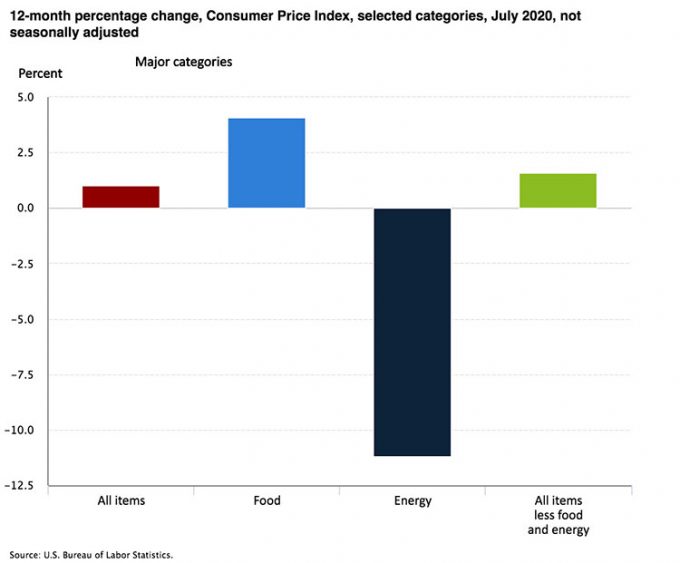by Valorie H. Rice
Senior Specialist, Business Information.
Current data releases as of 28 August 2020
Arizona is one of the top states in the nation for home price appreciation according to the recent Federal Housing Finance Agency House Price Index data release. The change in house prices between the second quarters of 2019 and 2020 was 5.4 percent in the nation with Idaho home prices rising the highest at 10.8 percent followed by Arizona at 9.1 percent. All 50 states and the District of Columbia had positive one-year changes in home price appreciation for the second quarter 2020. Phoenix and Lake Havasu City-Kingman were among the top twenty metropolitan areas for one-year house price appreciation in the second quarter. Phoenix ranked 11th with a 7.2 percent increase and Lake Havasu City-Kingman ranked 13th with a 7.0 percent increase. The top two metropolitan areas were in Idaho. Over-the-year home price changes in other Arizona metropolitan areas were 5.7 percent in Flagstaff, 5.6 percent in Prescott Valley-Prescott, 4.2 percent in Sierra Vista-Douglas, 6.2 percent in Tucson, and 4.9 percent in Yuma. The index for all 242 metropolitan areas includes both purchase and refinance mortgages.
Phoenix continued to have the highest home price gains for the 13th consecutive month in the S&P CoreLogic Case-Shiller Index with an over-the-year increase of 9.0 percent for June 2020. Seattle and Tampa followed Phoenix with 6.5 percent and 5.9 percent increases, respectively. Chicago had the smallest increase of the 19 cities reported for the month with a 0.6 percent change. Home prices nationally gained 4.3 percent over-the-year in June. The August 25 release noted that Detroit was not included due to records delays for the largest county in the Detroit metropolitan area. The 20-city composite (minus Detroit) had a one-year change of 3.5 percent in home prices.
Arizona employment was down 3.6 percent year-over-year in July before seasonal adjustment, not as low as the 7.7 percent decrease for the U.S. The August 20 Arizona Office of Economic Opportunity release indicated that trade, transportation and utilities gained jobs over-the-year in July as did other services and education and health services. Leisure and hospitality continued to have extensive losses with 60,600 fewer jobs than this time last year followed by a loss of 30,000 jobs in professional and business services. At 3.7 percent growth, Sierra Vista-Douglas was again the only Arizona metropolitan area to have positive year-over-year employment change. All other metropolitan areas in the state had a decrease in employment over-the-year in July with Flagstaff posting the heaviest decrease at -16.5 percent, followed by Lake Havasu City-Kingman -5.0 percent, Tucson -3.6 percent, Phoenix -3.5 percent, Yuma -2.8 percent, and Prescott -1.4 percent. Arizona seasonally adjusted unemployment rate was 10.6 percent in July, up slightly from 10.0 percent in June.
The Arizona seasonally adjusted unemployment rate of 10.6 percent in July was close to the U.S. rate of 10.2 percent. Unemployment rates reached a series high in three states – Connecticut (10.2 percent), New Mexico (12.7 percent), and New York (15.9 percent) according to the August 21 Bureau of Labor Statistics State Employment and Unemployment release. Utah had the lowest unemployment rate for the month at 4.5 percent. Unemployment rates were lower in 30 states, higher in nine and stable in 11 for July.
Employment increased in 202 of the 357 largest counties in the U.S. between March 2019 and March 2020 according to the County Employment and Wages August 19 release from the Bureau of Labor Statistics. Maricopa County employment increased 2.5 percent over-the-year in March ranking it 15th in percent change out of the largest counties in the country. Pima employment decreased 0.1 percent during that time. The average weekly wage increased 3.3 percent in the nation between the first quarter 2019 and first quarter 2020. Illinois was home to the counties with the highest and lowest over-the-year changes, with McLean, IL increasing 13.3 percent and Peoria, IL decreasing 12.8 percent. In Arizona, the average weekly wage increased 4.8 percent in Pima County and 3.9 percent in Maricopa County.
The Consumer Price Index rose 0.6 percent in July on a seasonally adjusted basis according to the August 12 Bureau of Labor Statistics release. Energy prices continued to rise in July, particularly gasoline which rose 5.6 percent for the month. Food prices on the other hand declined, after reporting substantial gains the last several months, with the index for food from home declining 1.1 percent in July. The index for all items less food and energy increased the largest amount since 1991 at 0.6 percent. Motor vehicle insurance prices soared in July following an increase in June. The 12-month percent change before seasonal adjustment for major categories, as reflected in Exhibit 1, posted an increase of 4.1 percent for food, 1.0 percent for all items, and 1.6 percent for all items less food and energy, while energy decreased 11.2 percent.
Exhibit 1: Consumer Price Index, Selected Categories, July 2020

U.S. real GDP decreased 31.7 percent in the second quarter 2020 according to the August 27 Bureau of Economic Analysis release. This second estimate, based on more complete source data, indicated less of a decrease than the advance estimate of -32.9 percent. The first quarter 2020 real GDP decreased 5.0 percent.





